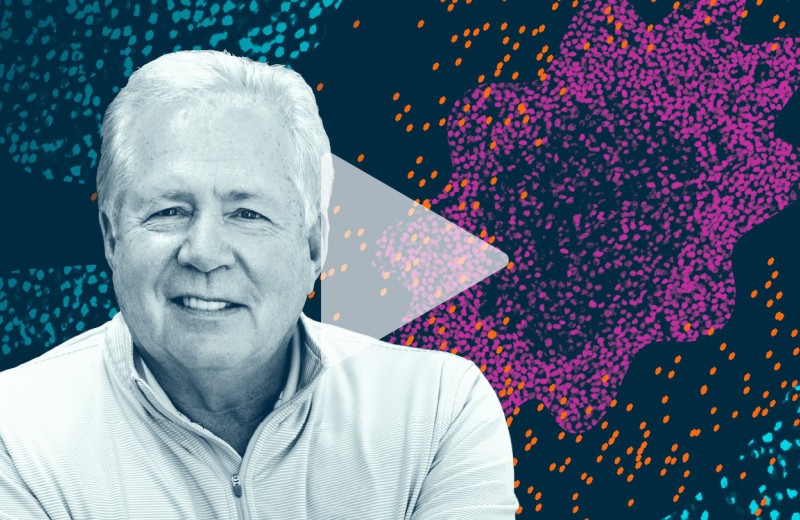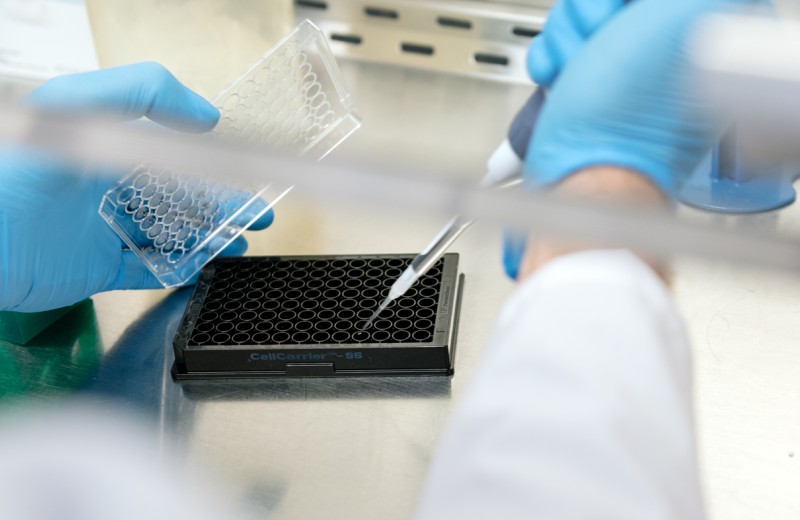Gladstone NOW: The Campaign Join Us on the Journey✕

Marielle Cavrois, PhD, directs the Flow Cytometry Core at the Gladstone Institutes, and she is a staff research scientist focusing on HIV transmission. She earned her PhD from the University of Lille in France and came to the United States for her postgraduate research.
What brought you to Gladstone?
While studying biochemistry and molecular biology in college, I became particularly interested in virology and cancer research. During my doctoral research, I studied how HTLV-1, the first retrovirus discovered in humans, leads to acute leukemia in some infected patients. I became fascinated by the ability of viruses to hijack cellular machinery for their own benefit. I joined the team of Warner Greene, MD, PhD, at Gladstone for my postdoc to study host/pathogen interactions at the cellular level. At that time, Gladstone already had a very strong reputation for training postdoctoral fellows, and I was confident that their training program would give me the foundation for becoming an independent and creative scientist.
What do you like about Gladstone?
In addition to being located in a beautiful city, what I love the most about Gladstone are the people. I always feel welcome at Gladstone, and I very much enjoy getting to know my colleagues. Everyone comes from different places and traditions; yet, the atmosphere is very harmonious. The passion for discovery is shared by everyone, which is both inspiring and motivating. In addition to teaming up with amazing scientists, I have been lucky to receive a lot of help from the administrative staff, who make me feel well supported when I face obstacles.
I also really like the simplicity and modern lines of the patio area that surrounds the Gladstone building.
Were you interested in science as a child?
As a child, I did not know what science was, but I always wondered how everything worked. I remember being puzzled by the Foucault pendulum, and I would think about it for hours until it finally made sense. Once I was in high school, I wanted to become a scientist who would find miraculous medicines to cure all kinds of diseases. I thought that all drugs came mostly from natural sources, so I wanted a job in “drug discovery,” because I thought it would combine traveling to exotic places to look for compounds with testing them in a laboratory.
Why did you decide to go to graduate school?
Going to graduate school was never really a question. I knew all along that I needed to go to graduate school in order to become a researcher. The question was more about the type of research I wanted to do and how to obtain a fellowship for my PhD.
What do you do when you are not working in the lab?
I love spending time with my family—my husband and two daughters. We enjoy traveling and outdoor activities, such as hiking, skiing, and surfing. For our next trip, we will fly to Iceland to explore the geysers and waterfalls, and perhaps even hike on glaciers. Sports are a big part of our family, and I started taking figure skating classes with one of my daughters.
If you could learn to do anything, what would it be?
I would love to learn photography and be able to capture the intensity of the moment and the personality of people.
What is your hidden/unique talent?
I am a good cook of “what is in the fridge.” This becomes very handy when raising kids and having a demanding job.
If you could meet any scientist from any point in time, who would it be and why?
I would have loved to meet Barbara McClintock, who pioneered modern genetics and discovered the existence of mobile genetic elements years before DNA was discovered. To me, she is the Albert Einstein of genetics. Scientists who can conceptualize their findings have always impressed me. Thanks to their amazing minds, we have made giant leaps in our understanding of the world.
40 Years of HIV Research: Celebrating the Career of Virologist Warner Greene
40 Years of HIV Research: Celebrating the Career of Virologist Warner Greene
Colleagues look back on Warner Greene's 40 year career
Gladstone Experts History HIV/AIDS Infectious Disease Greene LabTips from Virologists to Face the “Tripledemic” This Holiday Season
Tips from Virologists to Face the “Tripledemic” This Holiday Season
Gladstone scientists answer questions about the convergence of COVID-19, RSV, and the flu this winter
Gladstone Experts COVID-19 Infectious Disease Greene Lab Ott Lab Roan LabWhen Will This Pandemic End?
When Will This Pandemic End?
And other questions you have about Omicron and the pandemic
Gladstone Experts COVID-19 Infectious Disease Greene Lab Ott Lab Roan Lab



